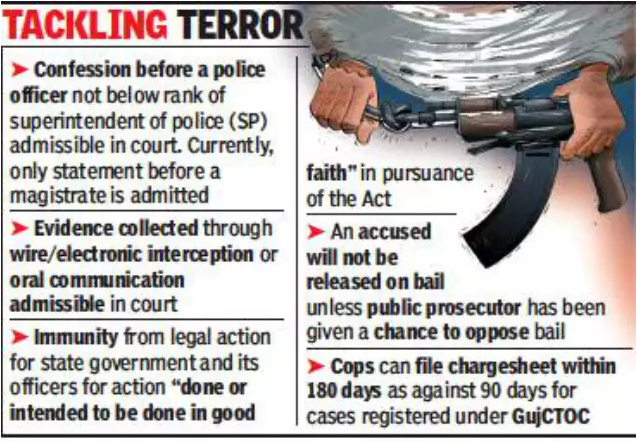The Gujarat Control of Terrorism and Organised Crime (GCTOC) Act 03/12/2019 – Posted in: Daily News – Tags: MCOCA
The Gujarat Control of Terrorism and Organised Crime (GCTOC) Act
For: Preliminary & Mains
Topics covered:
- The Gujarat Control of Terrorism and Organised Crime (GCTOC) Act
- The Maharashtra Control of Organised Crime Act
News Flash
The Gujarat Control of Terrorism and Organised Crime (GCTOC) Act, which received President’s assent on November 5 comes into effect on December 1.
The anti-terrorism law draws heavily from The Maharashtra Control of Organised Crime Act (MCOCA), 1999, with two significant differences:
- The checks on the interception of communication that are part of the Maharashtra law are missing in the Gujarat law;
- The definition of “terrorist act” in the GCTOCA also covers “intention to disturb public order”.
The Gujarat law defines a terrorist act as “an act committed with the intention to disturb public order or threaten the unity, integrity, and security of the State or to strike terror in the minds of the people or any section of the people…”
Features
- The new Act is intercepted telephonic conversations, which would now be considered as legitimate evidence.
- It provides for the creation of a special court as well as the appointment of special public prosecutors.
- Terrorist act definition – includes an act committed with the intention to disturb law and order or public order or threaten the unity, integrity and security of the state.
- The act also includes extortion, land grabbing, contract killings, cybercrimes, and human trafficking.
- Economic offences under GCTOC include Ponzi schemes, multi-level marketing schemes, and organised betting.
- Properties acquired through organised crime can be attached and Transfer of properties can be cancelled.
- Confessions made before a police officer to be considered as evidence.
- It provides 180 days’ time for authorities to file a charge sheet instead of the usual 90 days and proposes stricter conditions for bail.

The Gujarat Control of Terrorism and Organised Crime (GCTOC) Act
Advantages
- Increased safety and security of the Gujarat region which is a coastal state and shares an international border with Pakistan.
- Enhanced power to police officials to boost the security of the state.
- Help to control cybercrime and narco-terrorism fuelled by cross-border terrorist outfits.
Controversies
The Gujarat law deals only with the admissibility of evidence collected through interception, and does not mention the procedure for intercepting communication.
Its section 14 mirrors a corresponding section of MCOCA, and adds: “Notwithstanding anything contained in the Code (CrPC, 1973) or in any other law for the time being in force, the evidence collected through the interception of wire, electronic or oral communication under the provisions of any other law shall be admissible as evidence against accused in the court during trial of case.”
“Any other law” is not defined.
The Indian Telegraph Act, 1885 allows for interception, with minimal punishment for misuse. There are no safeguards such as regular review of interception, feedback on outcomes, permissible duration of interception or accountability. The Information Technology Act, 2000 too is vague on such details.
GCTOCA has no provision similar to the annual report mandated in the MCOCA, giving a full account of requests for interception, numbers of applications approved/rejected, prosecutions launched on the basis of such interception, and convictions resulting from them. This analysis of the utility of the interceptions must be submitted to the Maharashtra Assembly within three months of the end of the calendar year.
MCOCA: Five MCOCA sections (13, 14, 15, 16, and 27) deal with the interception of communication. The law states that the interception, if approved by the competent authority, cannot be for more than 60 days and that an extension would require permission.
Definition of ‘terrorist act’
The Gujarat law’s definition of a “terrorist act” is similar to the one in the repealed Prevention of Terrorism Act (POTA), 2002, but includes “an act committed with the intention to disturb public order”.
Widening of the definition “allows, say, the Patidar agitation to be described as an act of terrorism, allowing stricter punishment”.
The Unlawful Activities (Prevention) Act (UAPA), 1967, India’s main central anti-terror law, “does not allow an agitation of such form or scale (to be called) ‘terrorism’, and is instead covered under IPC sections, (and) the law of sedition, (which) is not effective enough for stringent punishment”.
Background
The Bill, earlier named as the Gujarat Control of Organised Crime Bill, failed to get the presidential nod thrice since 2004.
In 2015, the Gujarat government re-introduced the bill by renaming it as the GCTOC but retained the controversial provisions like empowering the police to tap telephonic conversations and submit them in court as evidence.
Source: Indian Express
READ MORE DAILY NEWS
- Coalbed Methane
- Supreme court on Electronic Evidences
- VoWi-Fi Technology
- The draft Registration of Press and Periodicals Bill, 2019
- Industrial Relations Code Bill, 2019
- Global Migration Report 2020
- Joint military exercise ‘SURYA KIRAN – XIV’
- Gandhipedia
You are on the Best Online IAS preparation platform. You are learning under experts.
We are present on Facebook- Diligent IAS, LinkedIn- Diligent IAS, YouTube- Diligent IAS, Instagram- Diligent IAS. Get in touch with us.
